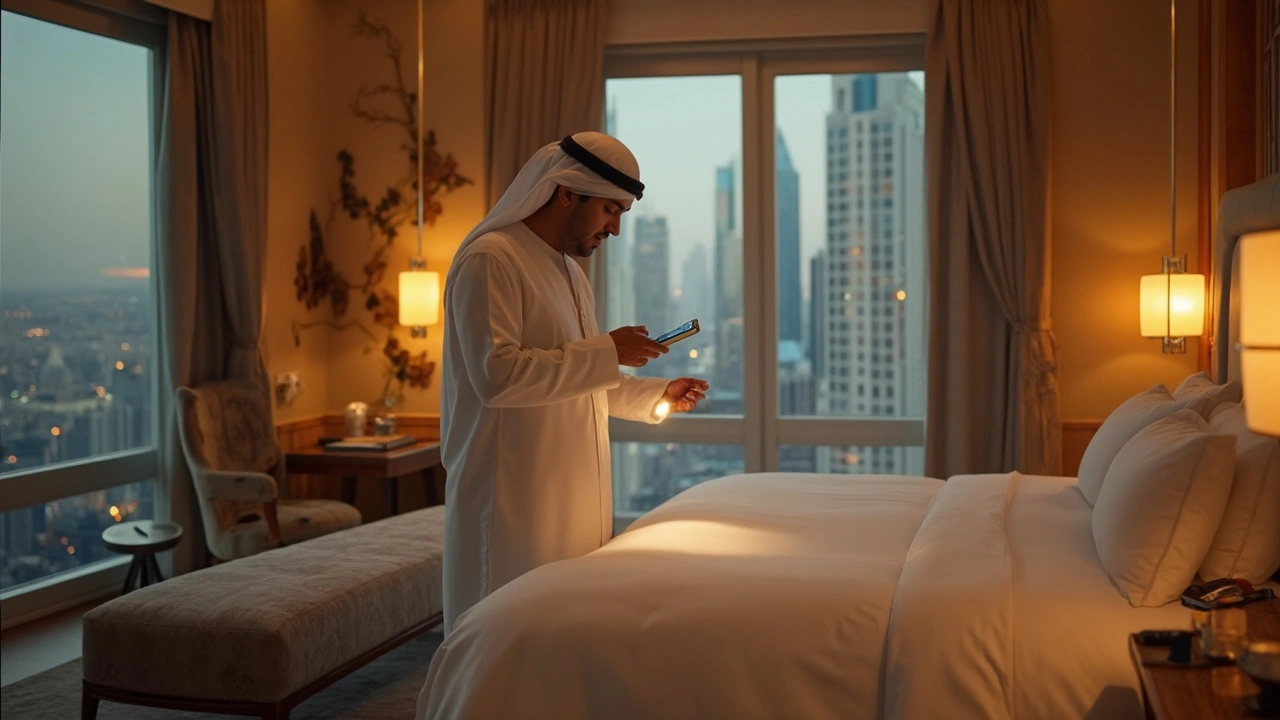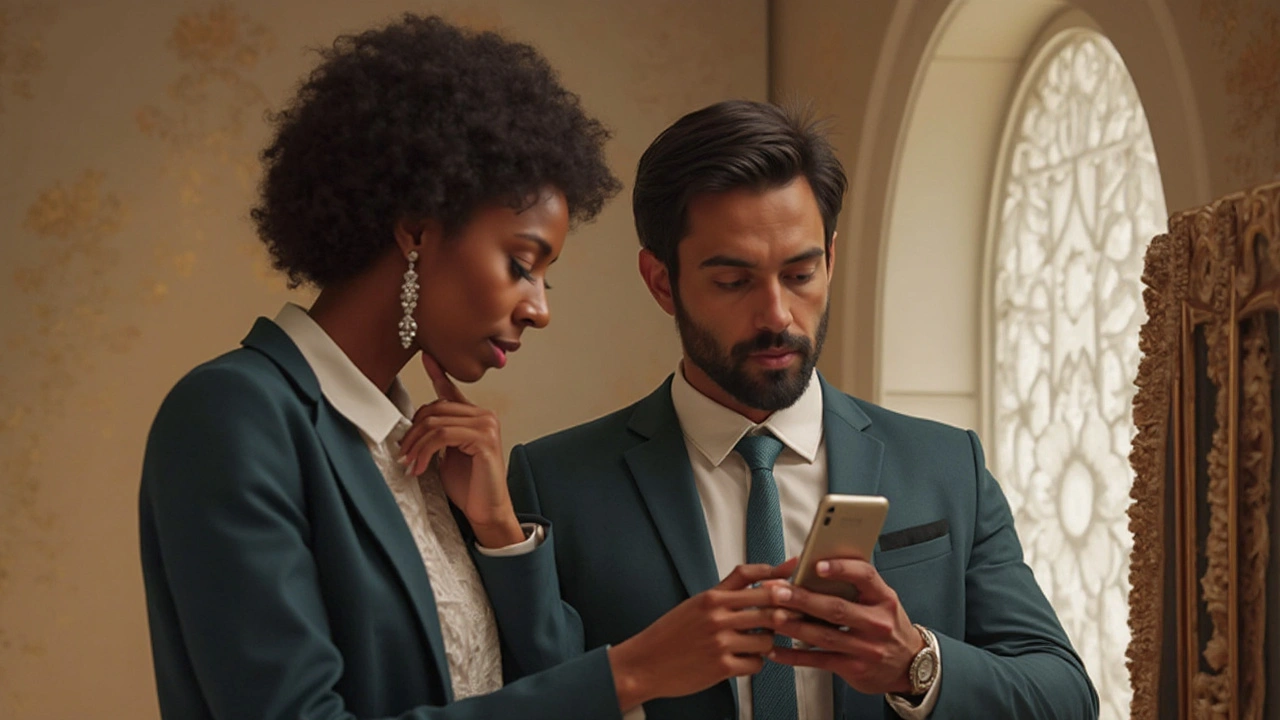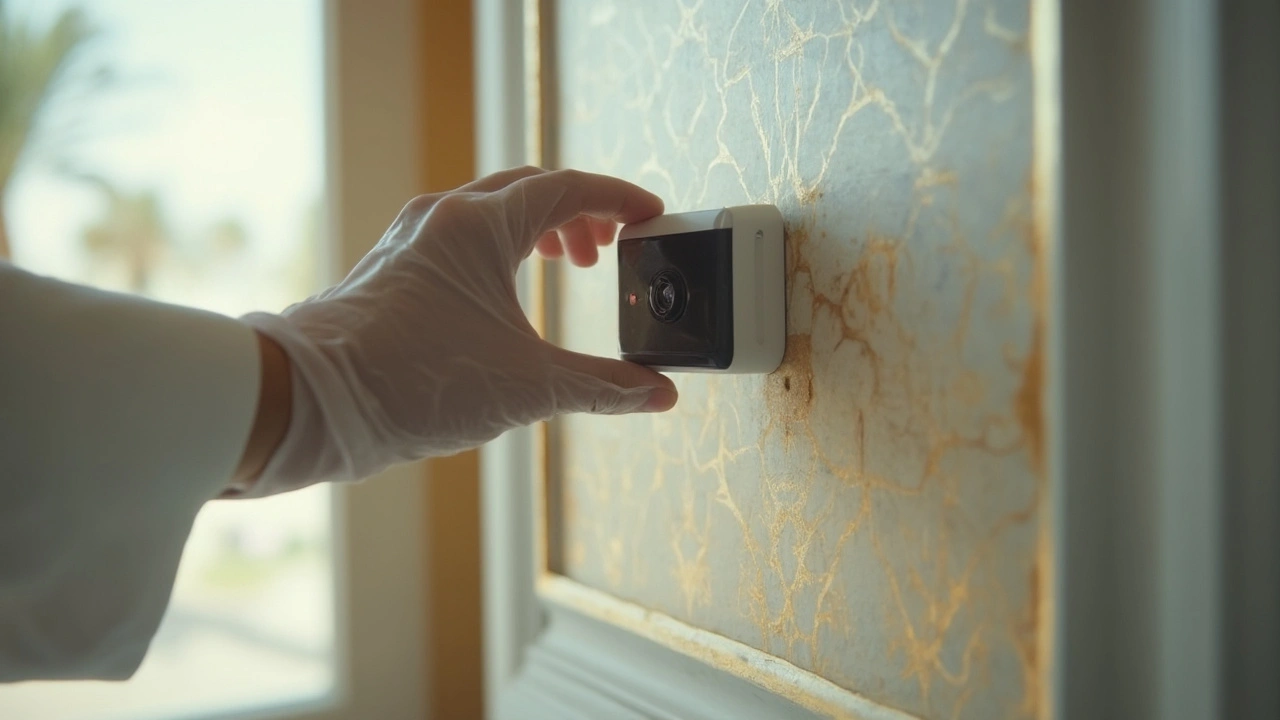
Hotels in Dubai usually scream luxury, but privacy slip-ups? Those can happen anywhere, even in the fanciest suites. If you’re working as an escort or just like your personal space untouched, hidden cameras are a real concern. These sneaky gadgets get smaller every year, and their favorite hiding spots might shock you.
Worried? Good. Being a little paranoid means you’re already a step ahead. Don’t waste time thinking it can’t happen to you. Cheap camera equipment is everywhere these days, and you can’t always spot it with the naked eye. But before you toss your phone across the room or stubbornly cover every inch of your space with towels, let’s get practical about what actually works—and what’s just movie drama.
First thing: no pro tools needed. You can check for most obvious cameras using tricks with just your phone and a bit of street smarts. Question anything that looks out of place: a smoke detector on the wall pointing toward the bed, an alarm clock you didn’t ask for, or plugs and outlets that seem slightly off. Trust that gut feeling if something looks weird. This is the start of taking back control of your privacy, right from the moment you roll your suitcase inside.
- Why Worry About Hidden Cameras?
- Where Cameras Could Be Hiding
- Quick Ways to Check Without Tools
- Gadgets and Apps That Actually Work
- What to Do If You Find a Camera
Why Worry About Hidden Cameras?
If you've ever seen stories pop up online about hidden cameras in hotels, you know it's not just a rare thing. In 2023, a well-publicized incident in South Korea saw over 1,600 guests secretly filmed and footage shared online. According to Dubai’s own Department of Tourism, hotels are supposed to keep guest privacy top of mind, but technology keeps making it easier for bad actors to slip cameras in without a trace. Even five-star spots aren’t immune—luxury doesn't always mean total safety.
Hidden camera risks aren’t just about personal embarrassment. For escorts and high-profile guests, leaked footage could lead to reputational damage, lost work opportunities, or even blackmail schemes. Once something hits the internet, it’s almost impossible to erase, and the impact can last way longer than the hotel stay.
While most Dubai hotels have decent security, it takes just one unsupervised maintenance worker or a previous guest with bad intentions to turn a room into a trap. And don’t get fooled into thinking you’d always spot the camera: a 2022 study out of the US found that less than 13% of people actually noticed hidden recording devices in a staged room. People get distracted, especially after a long trip or a night out—nobody's immune.
| Fact | Details |
|---|---|
| Recordings leaked in hotel hidden camera scandals (South Korea, 2019) | More than 1,600 guests filmed and 42 perpetrators arrested |
| Percentage of people who find staged cameras (2022 US study) | Only 13% |
| Dubai law on privacy | Recording someone without their consent is illegal; still, hidden cameras pop up every year |
All it takes is one mistake for your privacy to get wrecked. Whether you're working, on vacation, or just minding your business, it pays to be a little suspicious. Being careful isn’t about paranoia—it’s about taking charge of your own safety in a world that loves to spy.
Where Cameras Could Be Hiding
It’s wild how tiny and sneaky cameras have gotten. These days, bad actors can squeeze one into pretty much anything. If you’re spending the night in a hotel in Dubai, you need to know the most common hiding spots—because that’s where you need to look first.
Start with the obvious: anything facing the bed or bathroom. Perverts want a good angle, so cameras tend to end up in places looking right where you’d want the most privacy. Didn’t expect to be analyzing the air conditioner, did you? You should. Here’s where hidden cameras usually lurk:
- Smoke detectors, especially the kind installed in weird places like directly above the bed.
- Alarm clocks, digital radios, or wall clocks — tiny pinholes can be camera lenses.
- TVs and set-top devices, especially if there’s something “extra” plugged into the power outlet or HDMI port.
- Electrical outlets and light switches. Some cameras have even been found disguised as USB chargers.
- Air conditioners or air vents on ceilings or walls. A little black dot? Don’t ignore it.
- Mirrors. The classic spy trick is a two-way mirror. You can check with the “fingernail test” — put your nail against the glass, and if there’s a gap, it’s just a mirror. No gap? Get suspicious.
Smaller gadgets hide easily in spots like:
- Decorative items — think weird vases or photo frames aiming right at you.
- Lamps and bedside lights.
- Ceiling smoke alarms in the bathroom, which shouldn’t even be there (that’s kind of odd, right?).
Last bit: look for odors, new holes in the wall, or objects that don’t match the room’s style. If cleaning staff or maintenance seem extra worried about you touching certain stuff, that’s a red flag. Staying sharp about “Where Cameras Could Be Hiding” is your first move to keep your privacy check game strong every time you walk into a new room.

Quick Ways to Check Without Tools
You don’t need expensive gadgets to check for a hidden camera in your hotel room. Most sneaky cams are just regular electronic devices with a tiny lens exposed—you’ll spot them with a little attention to detail and a dose of common sense.
Start by cutting the lights for a minute. Stand in the dark and slowly scan the room. Hidden camera lenses are usually glass, so they reflect light. Flick on your phone’s flashlight and shine it toward mirrors, clocks, smoke alarms, and even odd wall decorations. If you catch an unexpected glint, check closer. No gadgets needed—just your eyes and your phone.
Next, walk up to every mirror and give it the old fingertip test. Place your fingertip against the glass. If there’s a gap between your finger and its reflection, it’s a standard mirror. No gap? It could be a two-way mirror. It sounds dramatic, but I tried it once in a shady apartment, and it beats staying ignorant.
Unplug anything that doesn't need to be on—digital clocks, odd chargers, random USB plugs. If the hotel room has an extra clock or charger you didn’t expect, ask yourself why. Also, check for tiny holes in unexpected places. Cameras need an opening, even if it's as small as a pinhead. Pay special attention to:
- Smoke detectors (especially those with a view of the bed)
- Air purifiers or random electronics facing a key spot in the room
- Alarm clocks that look out of place or brand new
- Power outlets and USB adaptors (especially multi-port ones)
Your phone camera can help spot infrared lights from night-vision cameras. Open your selfie camera (not all phone cameras pick up IR, but it’s worth a try if you have an older phone), and sweep it around the room while the lights are off. You’re looking for a tiny, steady purple or white dot on your screen—this could mean an active infrared camera.
| Location | Reason |
|---|---|
| Smoke Detector | Easy view, usually ignored |
| Alarm Clock/radio | Close to bed, looks normal |
| Plug Sockets/Adapters | Placed at eye level or facing main area |
| Desk items (pens, USBs) | Blends in, easy to hide lenses |
One last tip? Walk around after doing your checks and just trust your gut. If something gives you the creeps, don’t ignore it. Your instincts are usually right about this stuff. It’s not about paranoia—it’s about protecting your privacy, especially in a city where discretion is the name of the game.
Gadgets and Apps That Actually Work
Not all tech is just for people who know how to hack into NASA. You can actually get decent hidden camera detectors on Amazon or in electronic shops around Dubai, and they don’t need a degree to use. Most of these detectors work by spotting the tiny lens in a camera or picking up wireless signals that spy gadgets use.
The small red-light detectors are super popular. You look through them, aim at anything suspicious—like alarm clocks, phone chargers, or random screws on picture frames—and watch for a little flash or shine. A real camera lens will bounce the red light right back at you. I’ve tried this, and trust me, it’s fast and just a bit addicting. If you’re serious, choose one with high ratings (at least 4.5 stars from 500+ buyers) and costs under $30. No need to splurge for the pro gear.
Apps can help too, but here’s the honest bit: not all are great. The best “hidden camera detector” apps for iPhone and Android look for infrared lights or strange devices connected to your Wi-Fi. Useful, especially if you spot a blinking red dot in a dark bathroom or can list out every device on the hotel Wi-Fi and find something odd. Still, don’t trust just one app—double-check with your eyes and a real detector when you can.
- Physical detectors: Portable, spot live cameras fast, cost $20–$50 on average.
- RF (radio frequency) finders: These pick up signals, good for wireless hidden cameras. Just walk around the room—if it buzzes like crazy near a book or wall plug, get suspicious.
- Infrared (IR) apps: Free or paid apps can turn your phone’s camera into a basic detector. Works best in the dark—just look for weird glowing dots, which could be a hidden lens.
Here’s a quick look at the best types and what you can expect:
| Tool Type | How it Works | Price Range | Effectiveness |
|---|---|---|---|
| Red Light Lens Detectors | Reflects light off camera lens | $20–$50 | High for exposed lenses |
| RF Bug Detectors | Detects radio/wireless signals | $30–$80 | Great for wireless cams, not wired |
| Mobile Apps | Scan Wi-Fi/IR, alert to unknown devices | Free–$10 | Medium, good for quick checks |
If you’re in Dubai and want a local tip, Diera’s electronics market has options, plus delivery is quick anywhere in the city. Still, don’t rely on gadgets alone. Your own instincts and a sharp search will always protect your privacy best.

What to Do If You Find a Camera
Finding a hidden camera in your hotel room is not just creepy—it's illegal in Dubai, and the penalties are serious for hotels or individuals breaking your privacy. If you spot a device that looks suspicious, don't panic. Take clear action right away and don't try to handle it on your own.
- Don't touch or remove the camera. Your fingerprints could become evidence if the police get involved. Just leave it where it is.
- Take clear photos or videos of the device, its exact location, and any surrounding areas. Use your phone so the timestamps are saved.
- Document everything. Note down the time, date, and anything unusual you noticed during your stay. Details will help if there's an investigation.
- Contact hotel management immediately. Stay calm but firm, and ask to speak directly to a supervisor. Show them the evidence and request they call the police on your behalf.
- Call Dubai Police yourself if the hotel doesn’t respond quickly. The emergency number is 999. Privacy is taken seriously under UAE law, and authorities will act on your report.
- Request a new room or consider switching hotels. If you don't feel safe, don't stick around. You have a right to a secure space.
- If you work as an escort, think about your safety and reputation. Don’t share footage or post about it online before authorities have a chance to look into it—protect yourself from backlash.
For context: A 2023 Dubai police report said there were 9 arrests linked to illegal surveillance in hotels. While that's not a massive number, it's proof the law is enforced.
| Step | Why It Matters |
|---|---|
| 1. Don’t disturb the device | Keeps evidence intact for police |
| 2. Record evidence | Supports your case to hotel and police |
| 3. Notify hotel and police | Triggers proper investigation |
| 4. Move rooms or switch hotels | Protects your personal safety |
Remember, reporting right away is not just about your own safety—it's about stopping this from happening to someone else. Never ignore the risk when it comes to hidden camera threats. Staying alert and acting quickly are your best defenses.
Dubai Escort